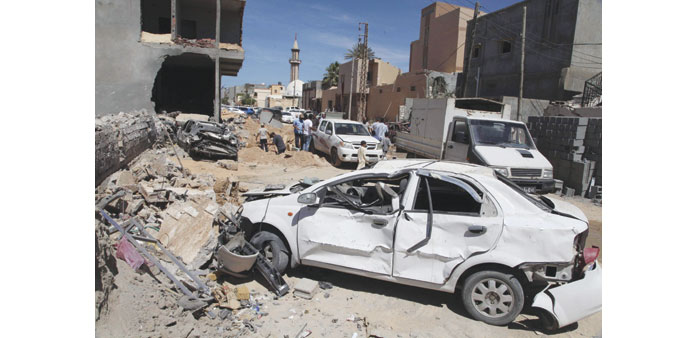Agencies
Rival rallies in the Libyan capital for and against an anti-jihadist renegade ex-general turned violent yesterday, leaving at least one person injured, witnesses and private television said.
The rival groups gathered in central Tripoli despite police efforts to keep them apart and skirmishes broke out, with protesters hurling stones and plastic water bottles at each other.
Al Nabaa television said one man was injured.
Witnesses in the city’s Martyrs Square said they also heard gunfire but it was unclear if they were warning shots by police or rounds fired by protesters.
On May 16, former general and long-time US exile Khalifa Haftar launched an offensive in second city Benghazi dubbed “Operation Dignity”, aimed at eradicating jihadist “terrorists”.
The eastern city, cradle of the Nato-backed revolt that toppled and killed veteran dictator Muammar Gaddafi in 2011, has become a bastion of jihadists blamed for a wave of deadly attacks on security forces.
Haftar has won widespread support for his campaign, including from air force units which have carried out air raids on jihadist positions in and around Benghazi.
His supporters see him as the man to build a strong national army capable of crushing radical armed groups which have sprung up across Libya from the ranks of rebels who fought in the 2011 revolt.
But Haftar has been branded an “outlaw” by Libya’s interim authorities, while his Islamist detractors have accused him of leading a coup—a claim he denies.
On Wednesday, Haftar escaped an assassination bid but three of his aides were killed when a suicide bomber attacked a villa outside Benghazi where he was holding a meeting.
l About 14,000 Libyans and refugees languish in overcrowded prisons in Libya, marked by torture, deplorable conditions and a lack of due process, the United Nations said yesterday.
About half of the inmates “continue to be deprived of their liberty without regard for due process”, many of them held since the 2011 conflict to overthrow Gaddafi, UN human rights spokesman Rupert Colville told a briefing in Geneva.
A further 7,000 refugees and migrants, many from the Middle East or sub-Saharan Africa who had travelled to Libya to try to reach Europe by sea, were also being detained, he said.
“Detention of refugees and migrants in Libya, instead of being an exceptional measure, as required under international law, is widespread and prolonged,” Colville said.
“They do not usually have the means to challenge their detention and are kept in extremely poor conditions, with chronic overcrowding and lack of basic sanitary conditions. They are also subject to ill-treatment and exploitation for labour.”
Armed groups hold prisoners in separate detention facilities that should be brought under government control, Colville said, noting that the United Nations last October documented 27 deaths in custody suggesting that torture was the cause.

